Practice Management Solutions for Business Growth
Level Up Your Practice with the Right Software
In today's professional environment, industry leaders across legal, healthcare, security, and compliance sectors face significant challenges in maintaining efficiency while delivering excellent service. Managing client expectations, navigating complex regulations, and handling administrative tasks can quickly become overwhelming. Optimizing workflows and improving productivity isn't optional—it's essential for any professional aiming to thrive. This necessity has driven practice management's evolution from paper-based systems to advanced software solutions that fundamentally change how businesses operate.
Traditional practice management relied heavily on manual processes, which often resulted in inefficiencies, errors, and wasted time. The introduction of computer technology marked a turning point, enabling the development of specialized software designed to automate key functions. Effective practice management solutions directly address profession-specific challenges by providing intuitive tools for scheduling, billing, client communication, and document management. A well-implemented system not only boosts efficiency but also enhances client satisfaction, strengthens security compliance, and contributes to a more profitable, sustainable practice.
This listicle examines the 10 best practice management solutions available today, carefully selected to represent the diverse needs of professionals like you. We'll analyze the core features, strengths, and intended users of each option, helping you make an informed decision that will elevate your practice. Whether you need to streamline billing processes, improve client interactions, or gain comprehensive insights into your practice's performance, this guide provides the essential information to help you select the ideal software for your specific requirements.
1. Whisperit
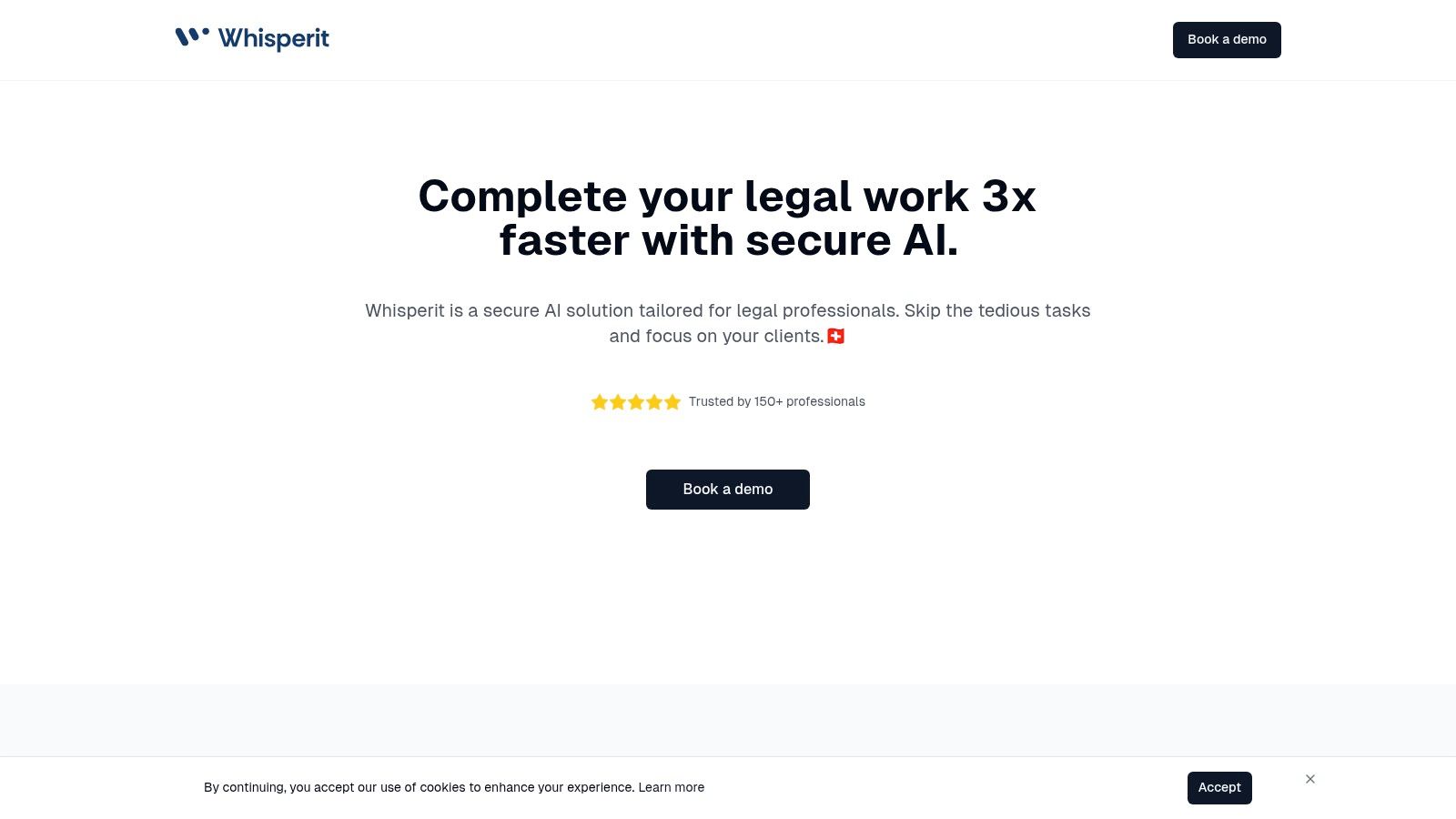
Whisperit is an AI-powered dictation and text editing platform that transforms document creation for professionals in document-intensive fields. It combines advanced voice-to-text capabilities with intuitive editing tools and customizable templates, making it a powerful solution for legal, healthcare, and compliance professionals. By allowing users to dictate complex documents directly into the platform, Whisperit significantly reduces preparation time while maintaining accuracy and efficiency.
The platform addresses a common pain point for professionals who spend hours creating and managing important documents. Instead of typing lengthy reports or briefs, users can speak naturally and have their words transcribed instantly, allowing them to focus more on content quality and less on the mechanics of document creation.
Practical Applications and Use Cases:
- Legal Professionals: Create legal briefs, transcribe depositions, draft contracts, and manage case files quickly and accurately. The platform includes legal-specific templates to further simplify document preparation.
- Healthcare Providers: Document patient encounters, generate medical reports, and maintain patient records efficiently. The dictation feature is particularly useful during consultations, enabling better patient engagement while ensuring thorough documentation.
- Compliance Officers: Create compliance reports, document audit findings, and manage policy documentation seamlessly. The platform's strong security features are especially valuable in this regulatory-focused field.
Key Features and Benefits:
- Advanced Voice-to-Text: Convert spoken words to written text with high accuracy and natural language processing.
- Intuitive Editing Tools: Refine and format transcribed documents using simple, powerful editing functions.
- Customizable Templates: Access pre-designed templates for specific professional documents, saving time and ensuring consistency.
- Robust Security: Benefit from Swiss hosting, end-to-end encryption, and full compliance with GDPR and SOC 2 standards.
Pros:
- Cuts document creation and editing time by a significant margin, boosting overall productivity.
- High-level security with Swiss hosting, comprehensive encryption, and strict compliance standards.
- Sector-specific templates designed for detailed documentation needs in legal, healthcare, and compliance fields.
- Trusted by over 150 professionals and leading law firms, demonstrating real-world effectiveness.
- Seamless integration of dictation, transcription, and editing functions through advanced AI technology.
Cons:
- Pricing information is not readily available on the website, requiring direct contact for quotes.
- Primarily focused on document-heavy industries, which may limit appeal for businesses with simpler documentation needs.
Implementation and Setup:
While specific technical requirements aren't detailed on the website, the platform appears to be web-based, minimizing installation requirements. For personalized onboarding support and setup guidance, contacting Whisperit directly is recommended.
Comparison with Similar Tools:
While many dictation and transcription tools exist in the market, Whisperit stands out through its specialized focus on professional sectors with high documentation demands. Its industry-specific templates and strong security features differentiate it from generic dictation software, making it particularly valuable for those working with sensitive information.
Why Whisperit Deserves its Place on this List:
Whisperit earns its spot through its targeted approach to document management for professionals in demanding fields. By combining AI-powered dictation, user-friendly editing tools, and strong security features, it directly addresses key challenges faced by legal, healthcare, and compliance professionals. For those looking to improve productivity and streamline document workflows while maintaining data security, Whisperit offers a complete solution.
Website: Whisperit
2. Clio
Clio stands out as a top cloud-based practice management solution specifically built for law firms. It offers a complete toolkit that helps streamline everything from client intake to billing. With its user-friendly interface and comprehensive features, Clio helps legal professionals boost efficiency and improve client service.
The platform provides a central hub for case management, allowing you to create custom fields and templates for different case types, track important deadlines, and organize documents effectively. Imagine managing a complex litigation case with all essential documents, communications, and deadlines accessible in one secure, centralized system. This eliminates bulky physical files and reduces the risk of lost information. Clio's client portal enables secure document sharing and communication, improving transparency and client collaboration. The integrated time tracking, billing, and online payment processing features make administrative tasks simpler and help ensure you get paid on time.
One of Clio's standout advantages is its extensive integration ecosystem with over 200+ third-party applications. This allows you to connect seamlessly with tools you already use, such as accounting software, email platforms, and calendars, creating a smooth digital workspace. For instance, connecting with QuickBooks Online simplifies your accounting processes, while Microsoft Outlook integration streamlines communication workflows.
Features:
- Case and matter management with custom fields and templates
- Client portal for secure document sharing and communications
- Time tracking, billing, and online payment processing
- Document automation and management with e-signature capabilities
- Extensive integration ecosystem (200+ apps)
Pros:
- Intuitive user interface with excellent mobile app functionality, allowing access to case information anytime, anywhere.
- Comprehensive feature set that scales from solo practitioners to large firms, making it adaptable to diverse needs.
- Strong security protocols with bank-grade encryption, ensuring client data confidentiality.
- Excellent customer support and extensive training resources, facilitating a smooth onboarding process.
Cons:
- Higher price point compared to some competitors, making it a significant investment, particularly for smaller firms.
- Some advanced features require higher-tier subscription plans, potentially increasing costs further.
- Learning curve for practices transitioning from traditional systems, requiring dedicated time for training and adaptation.
Pricing: Clio offers various subscription plans, starting from approximately $39/user/month for the basic plan. More advanced plans with additional features are available at higher price points. Contact Clio directly for detailed pricing information.
Technical Requirements: As a cloud-based solution, Clio requires a stable internet connection and a compatible web browser. The mobile app is available for iOS and Android devices.
Implementation Tips: Before switching to Clio, assess your firm's specific needs and select the appropriate subscription plan. Take full advantage of Clio's training resources and customer support for a smooth implementation. Consider migrating your data in stages to minimize workflow disruption.
You might be interested in: Legal Case Management System for a deeper dive into the benefits of such systems. This article provides valuable insights for legal professionals, healthcare providers, and security and compliance officers looking to improve their case management processes. Clio's solid functionality and user-friendly interface make it an excellent tool for any legal practice wanting to boost efficiency, improve client service, and embrace the benefits of modern, cloud-based practice management.
3. SimplePractice
SimplePractice has earned its place on this list as a leading practice management solution specifically designed for mental health professionals. It provides a complete set of tools that help streamline workflows, improve client engagement, and simplify administrative tasks. This makes it particularly valuable for therapists, social workers, counselors, and other healthcare providers who prioritize security and compliance.
For legal professionals who work with mental health experts, understanding SimplePractice can significantly improve case management and collaboration.
SimplePractice offers a solid platform covering essential aspects of practice management:
- Scheduling and Client Communication: The system sends automated appointment reminders to reduce no-shows, while online booking allows clients to schedule appointments whenever it's convenient for them. The secure client portal handles intake forms, document sharing, and HIPAA-compliant messaging, creating efficient and confidential communication channels.
- Documentation and Treatment Planning: Users can access customizable note templates and treatment plan creation tools to keep records organized and personalize their approach for each client. This feature proves especially useful for legal professionals who need access to well-documented client information.
- Billing and Insurance: The platform makes billing straightforward with electronic claim filing and insurance eligibility verification. This integrated approach helps practices manage their revenue cycle more efficiently while reducing administrative work.
- Telehealth: The platform includes HIPAA-compliant telehealth video sessions directly within the system, eliminating the need for third-party tools. This feature provides greater flexibility for both practitioners and clients in today's healthcare environment.
Pros:
- Purpose-built for Mental Health: The pre-built templates and forms are specifically designed for mental health professionals, saving time and ensuring compliance standards are met.
- User-Friendly Interface: The clean, intuitive platform makes navigation easy, even for users who aren't particularly tech-savvy.
- Excellent Mobile App: Practitioners can access client information, scheduling, and telehealth functions on the go, offering greater flexibility and responsiveness.
- Comprehensive Billing Features: Insurance verification and electronic claim filing make billing processes more efficient and improve revenue management.
Cons:
- Limited Customization: While the templates are helpful, some practitioners may find the customization options for documentation workflows somewhat restrictive.
- Tiered Pricing: Some advanced features that might be essential for larger practices require subscribing to higher-priced plans.
- Email-Based Support: Although generally responsive, customer support is primarily available through email, which isn't as immediate as phone support.
Pricing: SimplePractice offers several pricing tiers based on features and number of users. For the most current pricing information, visit their website: SimplePractice.
Technical Requirements: As a cloud-based solution, SimplePractice can be accessed through any web browser or mobile app (iOS and Android). The technical requirements are minimal – you'll just need a stable internet connection and a compatible device.
Implementation Tips:
- Data Migration: When switching from another system, SimplePractice provides data migration support to ensure a smooth transition.
- Template Customization: Spend time early on customizing the available templates to match your specific practice needs.
- Training and Support: Make full use of the available resources and training materials to get the most value from the platform.
SimplePractice stands out because of its focus on the mental health sector, offering a complete and easy-to-use solution for managing a modern practice. While it does have some limitations, its strengths in telehealth, client engagement, and specialized features make it a valuable tool for healthcare providers, legal professionals, and compliance officers alike.
4. TherapyNotes
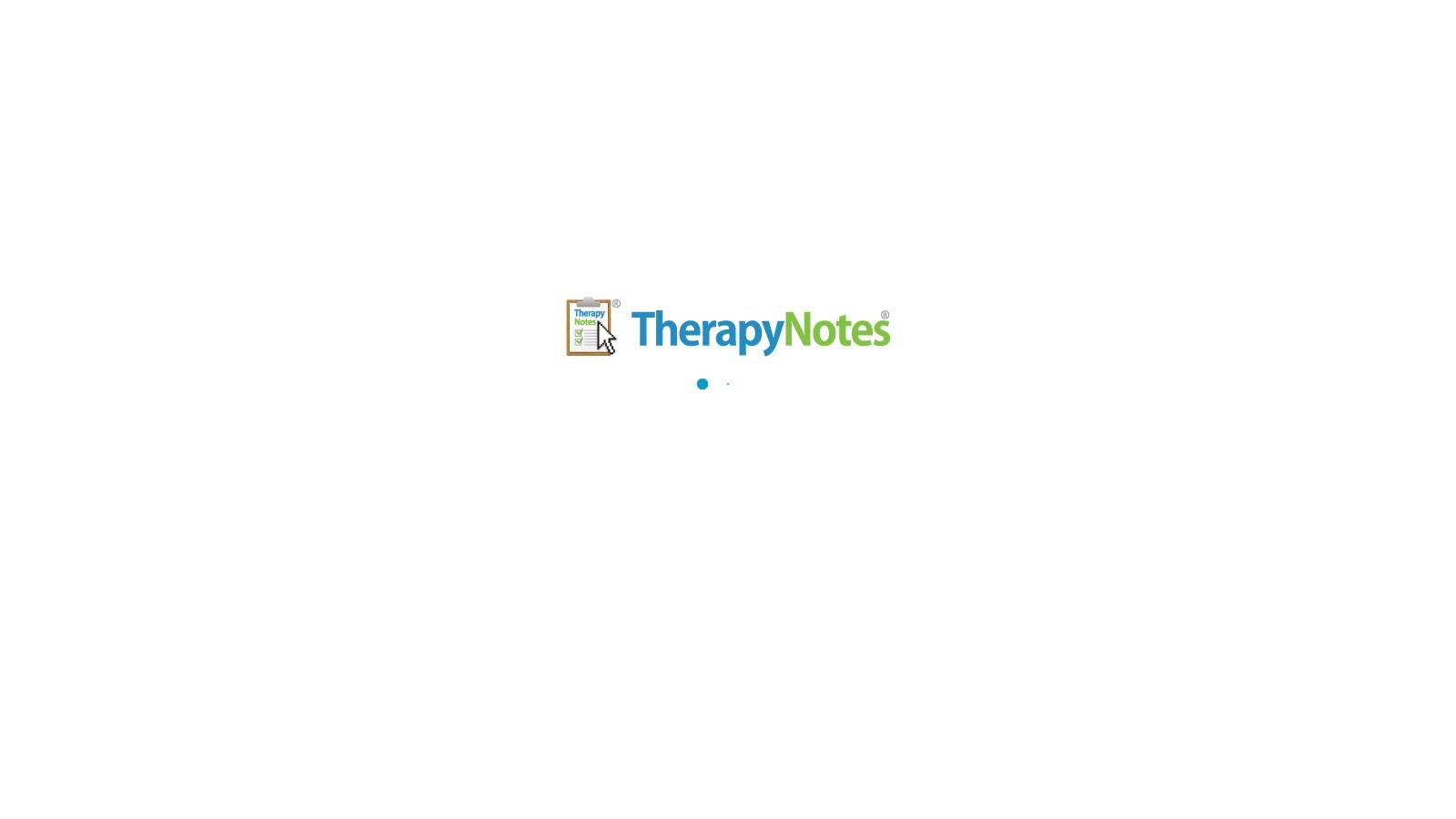
TherapyNotes stands out as a practice management solution built specifically for behavioral health professionals. Its dedicated focus addresses the unique needs of psychologists, therapists, counselors, and social workers by optimizing clinical documentation, scheduling, billing, and patient communication within a secure, HIPAA-compliant environment. Practices that prioritize efficient clinical workflows and comprehensive note-taking features will find TherapyNotes particularly valuable.
One of TherapyNotes' key strengths is its collection of specialized clinical note templates for different therapy types. These ready-made templates ensure documentation consistency and eliminate the need to create forms from scratch. The integrated patient portal enables secure messaging and document sharing, improving engagement between appointments. Automated appointment reminders via email, text, and phone significantly reduce no-shows while improving scheduling efficiency. The platform also includes integrated telehealth capabilities, allowing for seamless virtual sessions—an essential feature in modern healthcare delivery. Insurance claim filing with built-in eligibility verification simplifies the billing process and decreases administrative workload.
Features:
- Specialized clinical note templates tailored to different therapy types
- Built-in patient portal for secure messaging and document sharing
- Electronic insurance claim filing with eligibility verification
- Integrated telehealth platform for virtual sessions
- Automated appointment reminders via email, text, or phone
Pros:
- Specifically designed for mental health providers with relevant templates
- Strong focus on clinical documentation and note-taking efficiency
- Intuitive scheduling system with robust calendar management
- Excellent customer support with live phone assistance
Cons:
- Limited customization for certain documentation workflows. While the pre-built templates offer advantages, adapting them to highly specific practice needs can be challenging.
- Fewer third-party integration options compared to some competitors. Consider your existing software ecosystem before committing.
- Mobile app functionality is more limited than the desktop version. The full feature set works best on desktop platforms.
Pricing: TherapyNotes offers various subscription plans based on the number of clinicians. Detailed pricing is available on their website.
Technical Requirements: TherapyNotes is a web-based application accessible through any modern web browser. The mobile app is available for both iOS and Android devices.
Implementation/Setup Tips: Make full use of TherapyNotes' onboarding resources and customer support during implementation. Spend time exploring the available templates and customize them to match your practice's specific needs. Thorough staff training on the platform's features will maximize its effectiveness.
Comparison: While systems like SimplePractice and TheraNest offer broader functionality and integrations, TherapyNotes excels in its behavioral health specialization. If your practice heavily emphasizes streamlined clinical documentation within a secure environment, TherapyNotes' focused features make it worth considering.
Website: TherapyNotes
5. athenahealth
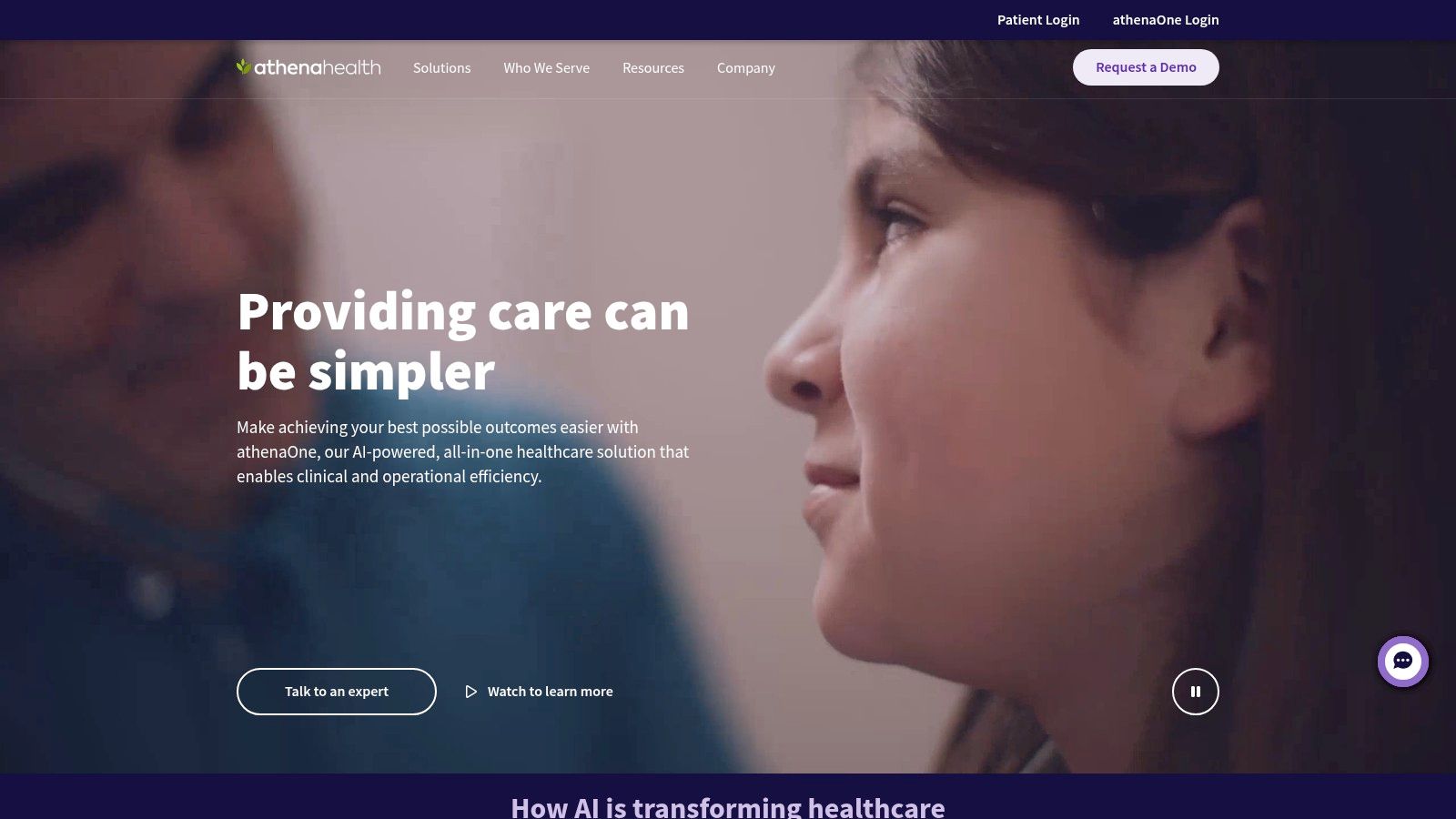
athenahealth stands out as a powerful solution designed specifically for healthcare organizations dealing with complex operational needs. Going beyond simple scheduling and billing functions, athenahealth offers a complete suite of tools that optimize workflows, enhance revenue management, and help deliver better patient care. This makes it particularly suitable for larger practices and healthcare systems seeking a comprehensive solution.
The platform is cloud-based, integrating electronic health records (EHR), medical billing, patient engagement, care coordination, and population health management into one cohesive system. By maintaining a single patient record throughout, the platform improves data accuracy and accessibility across departments. For legal professionals handling medical cases, this unified approach simplifies patient data access while maintaining compliance with healthcare documentation standards. For more information on this topic, check out: Essential Guide to Healthcare Documentation Standards.
Key features include:
- Integrated EHR and Practice Management: Uses a single patient record system to reduce data entry errors and improve communication between departments.
- Revenue Cycle Management: Features comprehensive billing tools including claim scrubbing, denial management, and real-time insurance eligibility verification—helping practices maximize revenue while reducing administrative work.
- Patient Engagement Tools: Offers self-scheduling options and a patient portal that improves provider-patient communication.
- Advanced Reporting and Analytics: Delivers insights into practice performance that support data-driven decisions and strategic planning—particularly useful for compliance officers tracking key metrics.
- Care Coordination and Population Health Management: Enables better provider collaboration, improving care quality for patients with complex medical needs.
Pros:
- Thorough medical billing capabilities focused on revenue optimization.
- Regular updates ensure regulatory compliance and minimize legal risks.
- Extensive network of connected providers enhances care coordination and referral management.
- Strong reporting tools provide valuable business intelligence.
Cons:
- Steeper learning curve compared to simpler practice management solutions.
- Higher cost than basic practice management options.
- Some users report issues with customer support responsiveness.
Pricing and Technical Requirements:
athenahealth uses a tiered pricing structure based on practice size and selected features. For specific pricing, you'll need to contact their sales team directly. As a cloud-based system, it requires minimal on-site hardware and IT infrastructure, though a reliable internet connection and compatible devices are essential for optimal performance.
Comparison with Similar Tools:
While athenahealth offers a comprehensive solution, other platforms like Kareo and SimplePractice provide more streamlined options that may better suit smaller practices. Kareo excels in billing and revenue cycle management, while SimplePractice is tailored for mental health providers. Your choice should depend on your practice's specific needs and size.
Implementation and Setup Tips:
For successful implementation, consider these important steps:
- Data Migration: Plan carefully for transferring existing patient data to the new system.
- Staff Training: Invest in thorough training to help staff use the system effectively and minimize disruption.
- Customization: Work with athenahealth's implementation team to adapt the system to your practice's specific workflows.
Website: athenahealth
6. MyCase
MyCase stands out as a user-friendly, comprehensive practice management solution built specifically for law firms. It brings together essential tools in one platform, enabling legal professionals to manage cases, communicate with clients, track time, and handle billing all in one place. This consolidated approach simplifies daily operations and eliminates the need for multiple disconnected software systems.
For attorneys managing multiple cases simultaneously, MyCase delivers practical features like customizable workflows and task assignments that keep team members coordinated and deadlines on track. The built-in client portal allows for secure document sharing and communication, which significantly improves transparency and client satisfaction. Picture being able to send documents for e-signature directly through the portal—no printing, mailing, or scanning required. This not only saves time but also creates a more professional experience for clients.
Financial management becomes much simpler with MyCase's integrated billing, invoicing, and online payment processing tools. These automated features save precious time and cut down on administrative work. The platform also includes lead tracking and intake management tools that make acquiring new clients more efficient.
Key Features:
- Case management: Customizable workflows and task assignment for efficient case organization.
- Client portal: Secure document sharing, communication, and e-signatures for enhanced client collaboration.
- Integrated billing: Invoicing, online payment processing, and financial reporting tools for simplified billing management.
- Document management: Versioning and e-signature capabilities for secure and organized document handling.
- Lead tracking and intake management: Streamlined tools for acquiring and onboarding new clients.
Pros:
- User-friendly interface: Minimal learning curve allows for quick adoption and efficient use.
- Affordable pricing: Competitive pricing makes it accessible to firms of all sizes. (Contact MyCase directly for specific pricing details.)
- Strong client communication tools: The built-in portal fosters transparency and strengthens client relationships.
- All-in-one platform: Reduces the need for multiple software solutions, simplifying workflows.
Cons:
- Fewer third-party integrations: Compared to some competitors, MyCase offers fewer connections with external applications.
- Limited customization options for complex workflows: While customization is available, it may not be sufficient for highly complex processes.
- Some advanced reporting features may be lacking: While basic reporting is included, some sophisticated analytical features might require additional specialized software.
Implementation Tips:
- Take advantage of MyCase's onboarding resources and tutorials to familiarize yourself with the platform.
- Customize case workflows and templates to match your firm's specific needs.
- Encourage client adoption of the portal to maximize its benefits.
Comparison with Similar Tools:
While MyCase shares similarities with Clio Manage and PracticePanther, it distinguishes itself through its focus on ease of use and client communication features. If client interaction and a straightforward interface are your top priorities, MyCase deserves serious consideration.
Website: MyCase
MyCase provides an excellent solution for legal professionals who want a straightforward, user-friendly platform to manage their practice and improve client communication. Its comprehensive features make it a strong choice for firms looking to boost efficiency and client service quality. When evaluating legal practice management software, consider your specific needs alongside the limitations mentioned above to determine if MyCase is the right fit for your firm.
7. Kareo
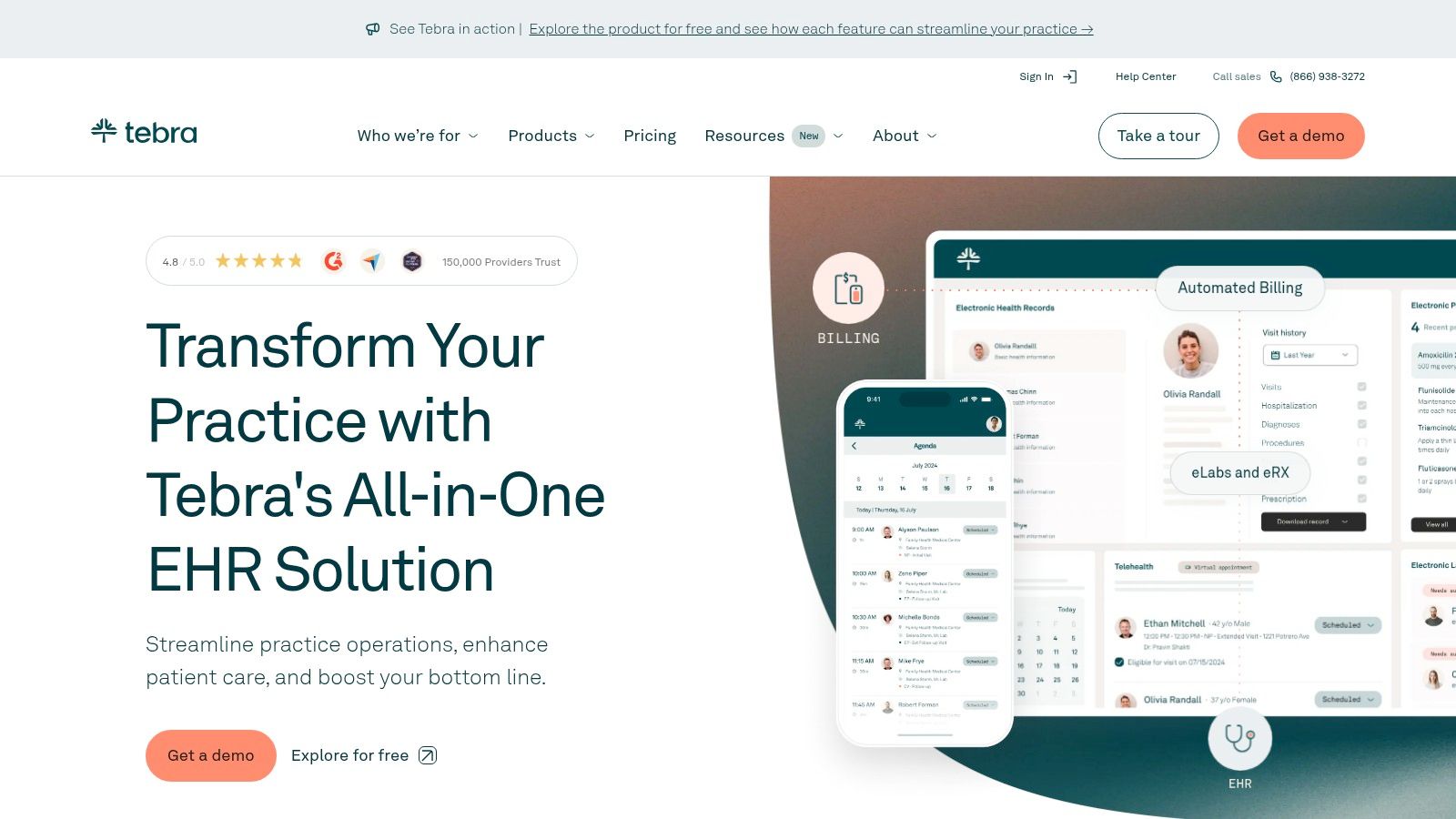
Kareo stands out as a robust, cloud-based practice management and EHR solution specifically designed for independent medical practices. For legal professionals working in healthcare litigation, compliance officers, and healthcare providers, understanding Kareo's capabilities is essential. Its core strengths lie in workflow optimization, revenue cycle management, and patient engagement tools that deliver real value to medical practices.
The platform integrates practice management, EHR, and billing functions into a single cohesive system. This unified approach eliminates the need for multiple separate systems, which is particularly beneficial for smaller and mid-sized practices looking for cost-effective solutions that don't compromise on functionality.
Key Features and Benefits:
- Integrated Platform: Kareo's comprehensive design connects every aspect of practice operations from patient intake and scheduling to billing and reporting. This integration helps reduce data entry errors and boosts overall efficiency.
- Patient Engagement: The built-in patient portal enables online bill payment, secure messaging with providers, and appointment requests. Legal professionals will appreciate how this feature creates compliant communication channels within healthcare settings.
- Automated Reminders: The system sends automatic appointment reminders that help reduce no-shows and improve patient adherence to treatment plans, directly improving scheduling efficiency and practice revenue.
- Insurance Verification and Claim Scrubbing: These tools help ensure accurate billing and minimize claim denials – critical functions for maintaining financial health and reducing compliance risks.
- Customizable Clinical Documentation Templates: While Kareo offers template customization options, specialized practices should note that customization capabilities may have limitations. This is an important consideration for practices with complex documentation requirements.
Pros:
- Designed for Independent Practices: Kareo's workflows match the specific needs of smaller practices rather than using a one-size-fits-all approach.
- User-Friendly Interface: Most users find the platform intuitive and easy to learn, minimizing training time for staff.
- Flexible Pricing: The modular pricing structure allows practices to select only the features they need, potentially reducing costs.
- Strong Customer Support: Users benefit from personalized support through dedicated account managers.
Cons:
- Performance Issues: Some users report occasional system slowdowns or glitches during peak usage times.
- Limited Customization for Complex Practices: While basic templates can be modified, highly specialized practices might find the customization options insufficient.
- Additional Costs for Advanced Features: Some advanced capabilities require purchasing extra modules, which can increase the total investment.
Pricing and Technical Requirements:
Specific pricing information isn't publicly available, but Kareo typically structures its pricing based on practice size and selected features. Contact their sales team directly for a customized quote. Being cloud-based, Kareo works on any device with internet connectivity, reducing the need for extensive on-site hardware or IT support.
Implementation and Setup Tips:
- Data Migration: Develop a careful data migration plan. Work closely with Kareo's support team to ensure smooth transition from existing systems.
- Staff Training: Despite the user-friendly interface, comprehensive staff training is essential for getting the most from the platform.
- Feature Selection: Carefully assess your practice's specific needs before selecting modules to avoid paying for unnecessary features.
Comparison with Similar Tools:
Kareo competes with other practice management systems like Athenahealth and eClinicalWorks. While Athenahealth focuses on larger practices and health systems, Kareo specializes in serving smaller, independent practices. eClinicalWorks offers similar capabilities but many users find it more complex to implement and navigate.
Website: Kareo
Kareo delivers a solid solution for independent medical practices seeking an integrated platform for practice management, EHR, and billing functions. Its user-friendly design and focus on smaller practices make it a valuable option in the healthcare technology space. However, potential users should carefully evaluate their specific needs against the platform's customization limitations and performance considerations. For legal professionals and compliance officers, understanding systems like Kareo provides important insights into the operational and compliance aspects of modern healthcare practices.
8. eClinicalWorks
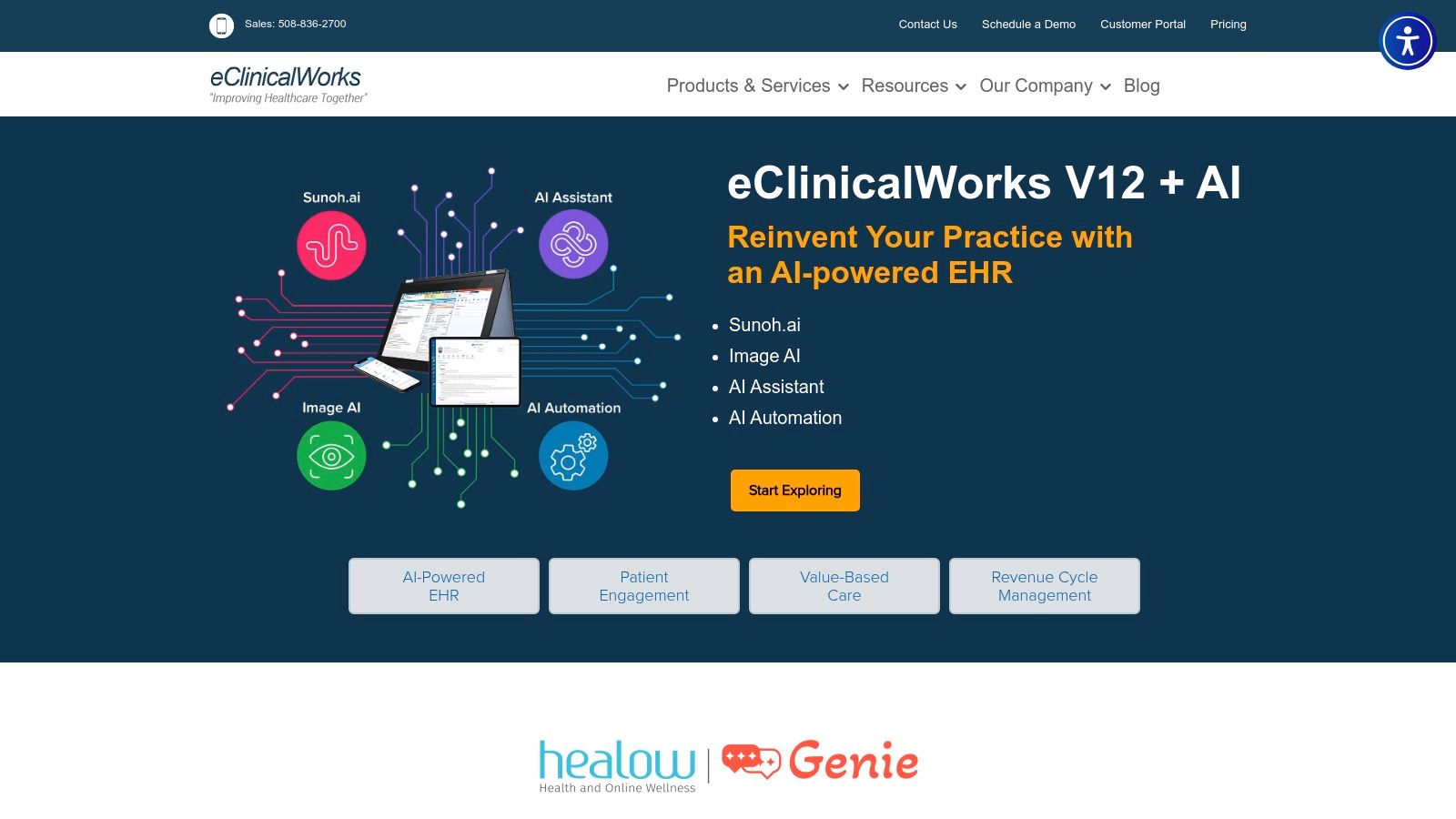
eClinicalWorks stands out as a comprehensive solution that addresses diverse medical practice needs, especially for larger practices and those with specialized workflows. The system combines EHR and practice management functionalities into one platform, eliminating data silos and improving workflow efficiency for healthcare providers.
This unified approach helps medical practices streamline their operations, deliver better patient care, and improve their financial performance without juggling multiple disconnected systems.
eClinicalWorks offers several key features tailored to modern medical practice needs:
- Integrated EHR and Practice Management: Specialty-specific templates make documentation more efficient across various medical fields from cardiology to dermatology. This thorough documentation system proves particularly valuable for legal professionals handling medical malpractice or personal injury cases by providing easy access to detailed patient records.
- Revenue Cycle Management: Features like automated claim scrubbing and denial prevention help practices capture more revenue while reducing administrative work. For practice managers, this means improved financial stability and faster payment processing. The detailed audit trails satisfy security and compliance requirements with comprehensive reporting capabilities.
- Patient Engagement: The robust patient portal allows self-scheduling, secure messaging, and access to medical records, helping patients take a more active role in their healthcare journey. These tools lead to greater patient satisfaction and better adherence to treatment plans.
- Telehealth Integration: The built-in telehealth platform enables virtual visits, making care accessible to patients with mobility limitations or those in remote areas. This feature has become a must-have in contemporary healthcare delivery.
- Population Health Management: Advanced analytics tools help practices identify trends across patient populations, enabling proactive interventions rather than reactive care. This approach particularly benefits practices managing chronic conditions and implementing preventative care strategies.
Pros:
- Comprehensive Solution: Handles every aspect of practice operations from patient intake through billing and reporting.
- Specialty-Specific Templates: Offers customized workflows for different medical specialties.
- Strong Interoperability: Easily exchanges health information with other healthcare systems.
- Robust Reporting and Analytics: Provides actionable insights based on practice data.
Cons:
- Steeper Learning Curve: The system's depth requires more training time for staff.
- Higher Cost: May be more expensive than simpler alternatives.
- Customer Support Challenges: Some users report delays in getting technical assistance.
- Time-Consuming Implementation: Larger practices often face extended setup periods.
Pricing and Technical Requirements:
eClinicalWorks pricing isn't publicly available and requires contacting their sales team for a custom quote based on practice size and needs. Technical requirements vary depending on whether you choose cloud-based or on-premise deployment. For specific details, it's best to consult directly with eClinicalWorks.
Implementation Tips:
- Thorough Needs Assessment: Define your specific practice workflows and requirements before implementation begins.
- Dedicated Training: Invest in comprehensive training for all staff members to maximize system benefits.
- Data Migration Planning: Create a detailed roadmap for transferring existing patient data to the new system.
- Ongoing Support: Arrange for continued support from eClinicalWorks or a certified partner after implementation.
Comparison with Similar Tools:
eClinicalWorks competes with other major healthcare platforms like athenahealth, Cerner, and Epic. While these systems offer similar core functionalities, eClinicalWorks distinguishes itself through its specialty-specific templates and integrated telehealth capabilities.
Website: eClinicalWorks
eClinicalWorks delivers a powerful solution for medical practices seeking an all-in-one platform. However, practices should carefully weigh its advantages against potential challenges like the learning curve and higher costs. Proper planning and staff training are essential for successful implementation and getting the most value from this comprehensive system.
9. TheraNest
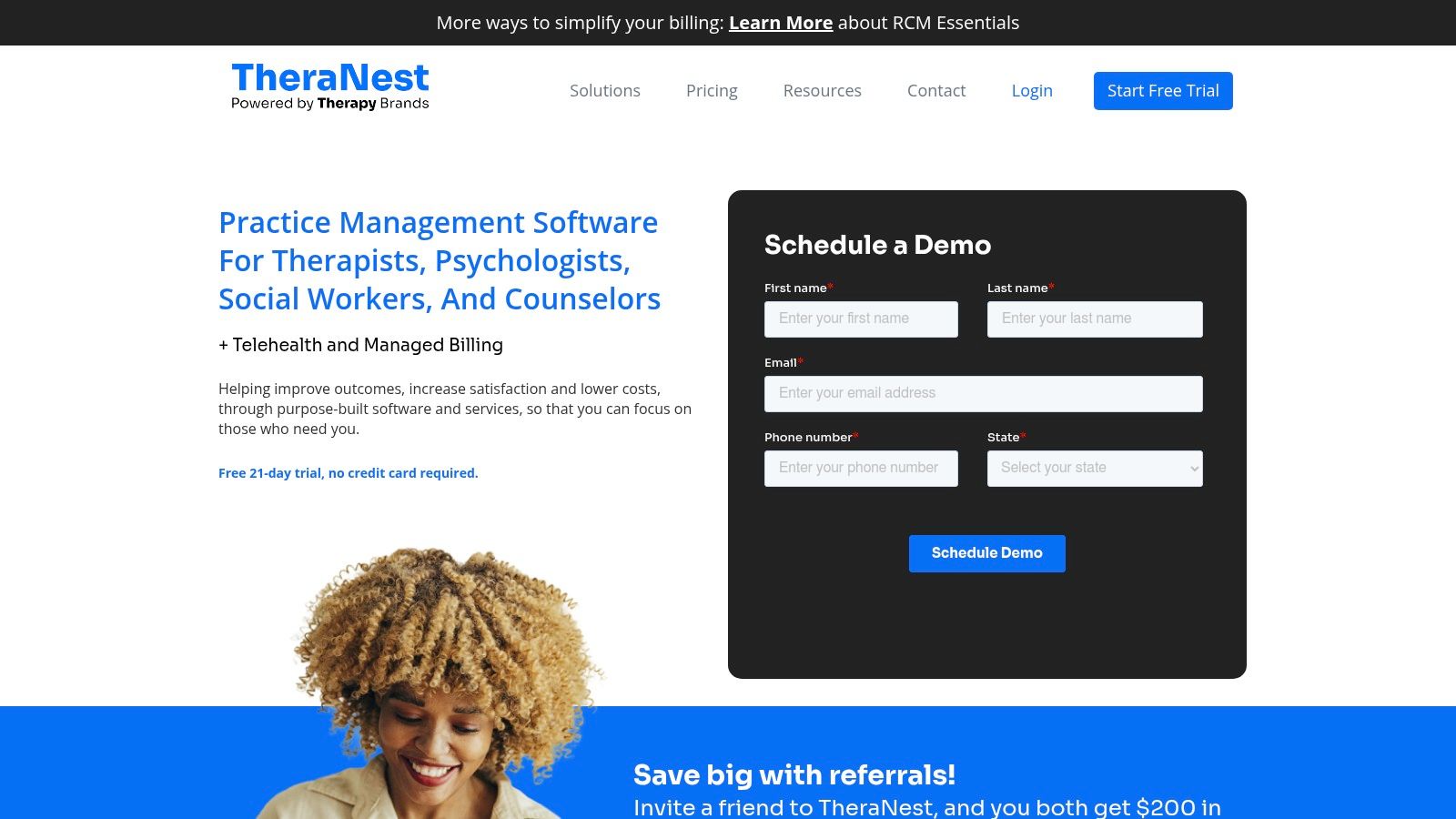
TheraNest stands out as a practical and cost-effective practice management solution specifically crafted for mental health professionals. Its complete toolkit addresses the specific needs of therapists, psychologists, social workers, and counselors, helping them reduce administrative burdens and focus on client care. This platform offers valuable features for legal professionals handling mental health cases, healthcare providers seeking unified systems, and compliance officers concerned with data protection.
TheraNest brings together essential practice management tools in one central platform, including:
- Electronic Health Records (EHR): The system features customizable templates designed specifically for mental health documentation, enabling consistent and efficient record-keeping. This is particularly valuable for legal professionals who may need access to these records for court cases, simplifying information retrieval while ensuring compliance. Healthcare providers benefit from streamlined documentation and potential connection with other healthcare systems.
- Client Portal: Their secure portal enhances client engagement through online intake forms, protected messaging, and document sharing. Legal professionals coordinating care find this especially useful for secure communication and accessing necessary documentation.
- Scheduling and Reminders: The automated appointment reminder system helps reduce no-shows and improves scheduling efficiency, freeing up valuable administrative time.
- Integrated Telehealth: Built-in telehealth capabilities enable secure virtual sessions, expanding access to care and offering flexibility for both clients and practitioners.
- Insurance Billing: The platform simplifies insurance processing with electronic claim submission, reducing paperwork and improving payment management. This feature particularly benefits healthcare providers and billing departments.
Pros:
- Affordability: A tiered pricing structure makes TheraNest suitable for both individual practitioners and larger practices.
- User-Friendly Interface: The system is designed for easy navigation, requiring minimal training time for busy professionals.
- Unlimited Document Storage: All subscription levels include unlimited document storage, eliminating concerns about storage limitations.
- Responsive Customer Support: Users consistently praise the quality of TheraNest's customer service.
Cons:
- Occasional Slowdowns: Some users report system performance issues during high-traffic periods.
- Limited Advanced Reporting: While adequate for most practices, the reporting capabilities aren't as extensive as some premium alternatives.
- Mobile App Functionality: The mobile application offers fewer features compared to the desktop version.
Website: TheraNest.com
Implementation Tips:
- Data Migration: When switching from another system, take advantage of TheraNest's data import services for a smoother transition.
- Customization: Invest time in customizing templates and features to match your specific practice requirements.
- Training: Though the interface is intuitive, use available training resources to get the most value from the platform.
Comparison with Similar Tools:
While TheraNest shares similarities with competitors like SimplePractice and TherapyNotes, it distinguishes itself through its mental health focus, competitive pricing, and straightforward interface. Practices that need advanced reporting features and a fully-featured mobile app might want to explore alternatives. However, for professionals who value affordability, ease of use, and solid core features, TheraNest remains an excellent choice. Legal professionals and security officers particularly appreciate the secure client portal and comprehensive EHR system for managing sensitive information and maintaining compliance standards.
10. Dentrix
Dentrix stands out as a comprehensive practice management solution built specifically for dental offices. This all-in-one system does much more than handle basic scheduling and billing—it offers integrated tools that optimize workflows, enhance patient care quality, and boost practice profitability. Its dental-specific design makes it particularly valuable for practices looking to improve their operations.
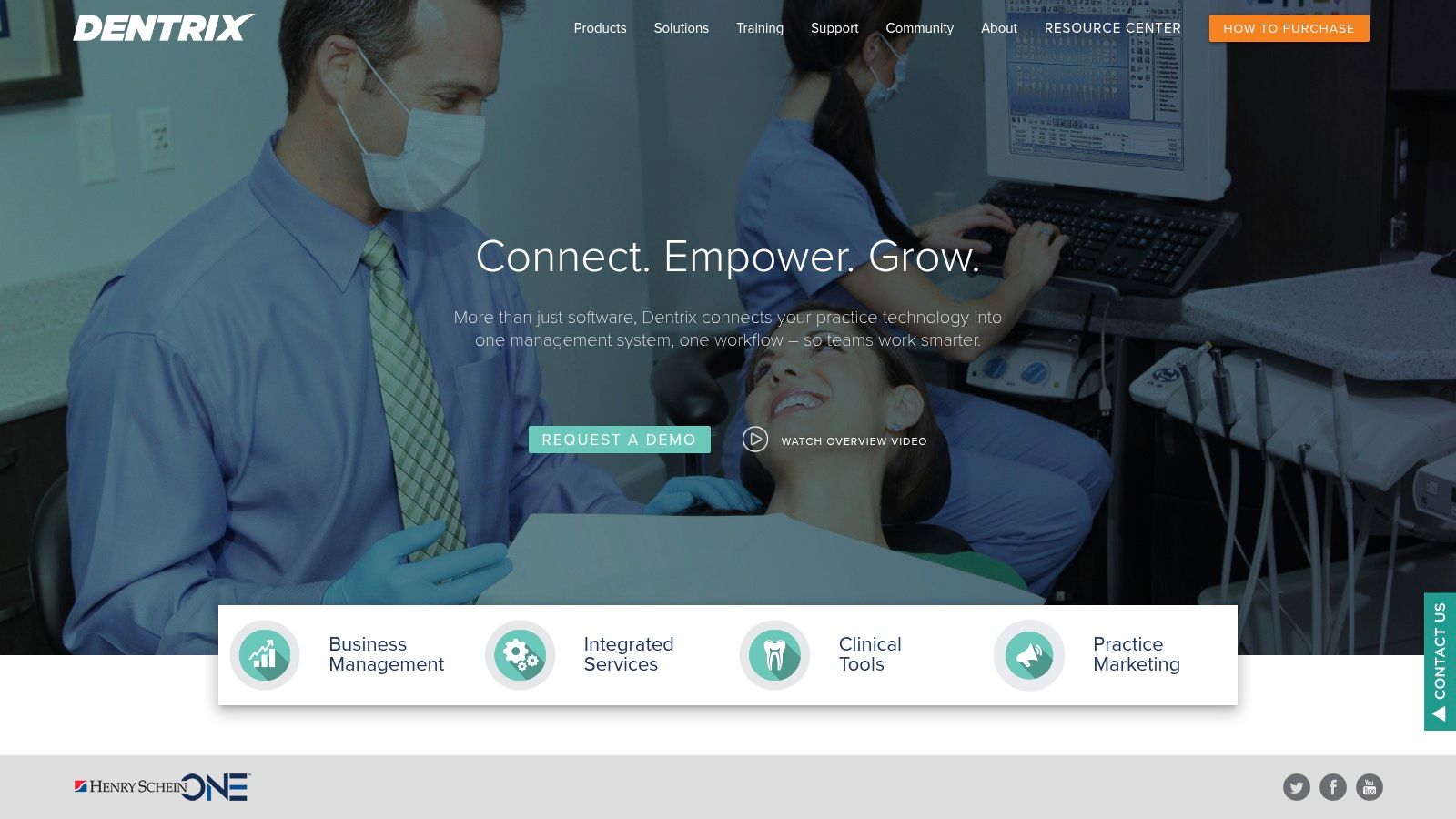
Dentrix centralizes essential practice functions from scheduling and charting to treatment planning and insurance processing. Consider this everyday scenario: a patient calls to book an appointment. Using Dentrix, your receptionist can immediately view available time slots, schedule the visit, and update the patient's record with important information—all in one system. Later, the dentist can access the patient's complete digital chart, complete with detailed tooth and periodontal mapping, to develop treatment plans using visual presentation tools. This seamless information flow reduces errors and saves time. The system's integrated insurance verification and electronic claims processing also simplify billing and help ensure faster reimbursements.
For dental healthcare providers, Dentrix offers exceptional value through its specialized features. The digital charting with visual representations makes diagnosis more accurate and treatment planning more efficient. Its compatibility with various dental imaging systems eliminates manual image transfers, saving valuable time and improving precision. For those responsible for security and compliance, Dentrix provides robust data management and security features essential for maintaining HIPAA compliance and safeguarding sensitive patient information.
Features:
- Digital clinical charting with graphical tooth and periodontal mapping
- Integrated patient scheduling and appointment management
- Treatment planning tools with visual case presentation
- Insurance verification and electronic claims processing
- Practice analytics and business intelligence reporting
Pros:
- Specifically designed for dental workflows and terminology, making it intuitive for dental professionals.
- Comprehensive solution covering all aspects of dental practice management, reducing the need for multiple disparate systems.
- Strong imaging integration with various dental imaging systems.
- Extensive training and support resources available.
Cons:
- Higher price point compared to some general practice management solutions. While pricing isn't publicly listed, it's generally understood to be a more premium option.
- Steeper learning curve for new users due to the breadth of features.
- Some advanced features require additional modules at extra cost.
- Requires more substantial hardware resources than cloud-based alternatives.
Implementation/Setup Tips:
Implementing Dentrix requires careful planning and execution. Data migration from existing systems should be prioritized. Taking advantage of the available training resources is crucial for maximizing the software's potential. It's also recommended to involve the entire team in the implementation process to ensure smooth adoption. You might be interested in: Ultimate Guide to Business Process Streamlining for tips on optimizing your processes during implementation.
Comparison with Similar Tools:
While other practice management solutions exist, few cater specifically to the dental industry with the depth that Dentrix offers. Alternatives like Open Dental and Eaglesoft offer similar functionalities but might not have the same level of integration or specialized features.
Website: https://www.dentrix.com/
Read also: [The Ultimate Guide to Business Process Streamlining] for more insights into optimizing workflows within your practice. When properly implemented, Dentrix becomes a powerful tool for enhancing productivity, improving patient care, and maximizing revenue. For legal professionals working with dental practices, understanding the capabilities of systems like Dentrix can be beneficial in advising clients on compliance and best practices.
Practice Management Solutions: Top 10 Comparison
| Name | Core Features & Security (✨) | User Experience (★) | Value Proposition (💰) | Target Audience (👥) |
|---|---|---|---|---|
| 🏆 Whisperit | AI dictation & transcription; Swiss hosting; GDPR/SOC2 | Intuitive, 2x faster document creation | Boosts productivity with strong privacy | Legal, healthcare, & document pros |
| Clio | Case management; document automation; secure portal | User-friendly & mobile-optimized | Comprehensive solution (premium pricing) | Law firms & legal professionals |
| SimplePractice | HIPAA-compliant telehealth; scheduling; customizable forms | Clean & easy-to-use interface | Tailored features with solid billing tools | Therapists, counselors, social workers |
| TherapyNotes | Clinical note templates; secure messaging; telehealth | Efficient scheduling & live support | Focused on documentation and client care | Psychologists, therapists, counselors |
| athenahealth | Integrated EHR; revenue cycle; real-time insurance | Robust functionality with a learning curve | Optimizes revenue & care coordination | Medical practices & healthcare organizations |
| MyCase | Case management; client portal; billing integration | User-friendly with minimal learning curve | All-in-one legal practice management | Law firms & solo practitioners |
| Kareo | EHR, billing, & scheduling; automated reminders | Simple interface with responsive support | Flexible modules for independent practices | Small/independent medical practices |
| eClinicalWorks | Unified EHR; telehealth; advanced analytics | Comprehensive, but with a steep learning curve | Deep integration for complex practice needs | Varied medical specialties & large orgs |
| TheraNest | EHR; scheduling; telehealth; billing for mental health | Affordable & intuitive | Streamlines administrative tasks effectively | Therapists, counselors, mental health pros |
| Dentrix | Digital charting; treatment planning; imaging integration | Tailored for dental workflows; moderate learning curve | Optimizes dental operations & revenue | Dental offices & practices |
Choosing the Perfect Practice Management Solution
Selecting the right practice management solution is a critical decision that can significantly impact your business operations. Whether you're a legal professional, healthcare provider, or compliance officer, the tools mentioned above offer various features to improve workflows and boost productivity. With numerous options available, finding the perfect match for your specific needs requires careful consideration and research.
When evaluating solutions like Whisperit, Clio, SimplePractice, TherapyNotes, athenahealth, MyCase, Kareo, eClinicalWorks, TheraNest, and Dentrix, start by identifying your specific industry requirements. Some platforms excel in certain sectors, while others provide broader functionality across different fields. Think about which features are most essential for your daily operations. Do you need robust scheduling tools? Is billing functionality your primary concern? Or perhaps secure client communication is non-negotiable for your practice?
The onboarding experience varies widely between platforms. Some solutions offer intuitive interfaces with minimal learning curve, while others might require substantial training. Before making your decision, investigate the level of customer support provided by each vendor, including availability of tutorials, documentation, and live assistance.
Financial considerations should be at the forefront of your decision-making process. Pricing structures differ significantly—from monthly subscriptions to one-time purchases with additional fees for maintenance. Assess your budget realistically and determine which solution provides the best value for your investment, considering both immediate costs and long-term expenditures.
Compatibility with your existing tech stack is another crucial factor. The right solution should integrate seamlessly with your current systems, whether that's an electronic health record (EHR) system or customer relationship management (CRM) platform. Proper integration ensures smooth data flow and prevents creating information silos within your organization.
Key Takeaways:
- Needs Assessment: Determine your specific requirements and prioritize essential features.
- Budget Considerations: Compare pricing models and calculate total ownership costs.
- Implementation & Support: Evaluate ease of setup and quality of vendor support.
- Integration & Compatibility: Ensure the solution works with your existing systems.
Ready to transform your document creation and management workflow? Whisperit is an advanced AI dictation and text editing platform designed for professionals in legal, healthcare, and other industries requiring secure document handling. This powerful tool helps create documents up to twice as fast as conventional methods, giving you back valuable time to focus on other aspects of your practice. With secure Swiss hosting, GDPR and SOC 2 compliance, and flexible integration options, Whisperit protects your sensitive data while boosting productivity. Experience more efficient document management—learn more and request a demo at Whisperit.